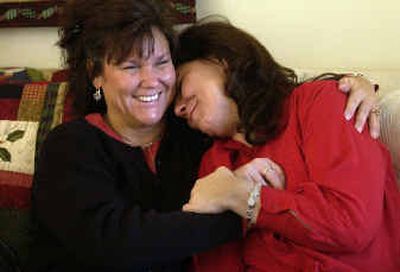The greatest gift of all

Vicki Tomal walked into her sister’s hospital room with an IV at her side.
“Get your butt out of bed,” Tomal told her older sister, Keri Barham, on Dec. 10, 2003, the day after Tomal received Barham’s right kidney.
After years of declining health from failing kidneys, Tomal’s energy level was rising.
A little more than a year later, the two sisters – both healthy – celebrated Christmas with their extended family at the home of their mom, Glenna Stensgaard, in Spokane Valley.
When the family arrived in Seattle for transplant surgery in 2003 at Virginia Mason Medical Center, they were shocked at Tomal’s condition. Her color was yellowish. She was losing some hair. She couldn’t stay awake.
Tomal, who lives in Juneau, Alaska, with her two boys, hadn’t seen her mom in a couple of years. Barham, 40, who lives in Liberty Lake, hadn’t seen Tomal in almost four years.
“When we first saw her that first day at Virginia Mason, she scared all of us,” Stensgaard said.
Tomal, 37, admits that she had been in denial about her condition. After kidney surgery in her teens, she hadn’t noticed kidney problems for about a decade. But some complications began to surface in her 20s, and five years ago, her doctors said her kidneys were functioning at 30 percent of normal.
Since then she began to bruise easily. She was drained of energy and took nap breaks at work instead of lunch breaks. She depended on fast food to feed her kids because she was exhausted by the time work was done.
“I didn’t know how sick I was. I was in denial,” Tomal said. “I really tried to make my life as normal as possible.”
As her health deteriorated, her doctors said she would soon need a new kidney or at least have to start dialysis.
“She called me up and said, ‘I need your kidney, by the way,’ ” Barham recalled.
Barham got tested to see if one of her kidneys would work. The results showed a perfect match. But Tomal knew that asking for her sister’s kidney was asking a lot – especially, from a sister who almost fainted while visiting Tomal in the hospital when she had surgery in her teens.
“At that point I wasn’t prepared and neither was my family,” said Barham, who has a husband and three kids. “I had to say no at that point.”
But after doing more research on the transplant, Barham decided in the summer of 2003 that she would go under the scalpel.
“I got on the Internet and read a lot of people’s stories,” Barham said. “I just had that peace all summer, and I just knew it was time. I wasn’t a chicken anymore.”
Barham’s gift prevented Tomal from having to get on a waiting list for an organ, something Tomal was preparing to do.
More than 56,000 patients are on waiting lists for kidney transplants nationwide, but only 8,000 kidneys are available for transplant annually, according to a recent article in the San Francisco Chronicle.
Having gone through the experience, Barham said people should consider becoming organ donors. Even with only one kidney, kidney donors usually make full recoveries and live normal lives.
“I would never know I was missing anything,” Barham said.
Earlier this month the sisters met in Juneau to mark the first anniversary of the surgery.
“It makes us realize that we need to see each other more often,” Barham said.
True to form, Tomal wants to sky-dive on their second transplant anniversary. Barham prefers to go to the spa.
“Keri is a little more conscious of protecting their single kidneys,” Stensgaard said.